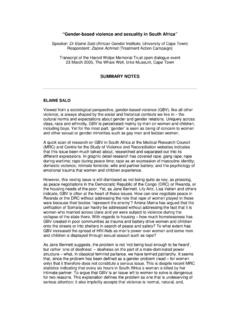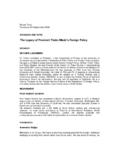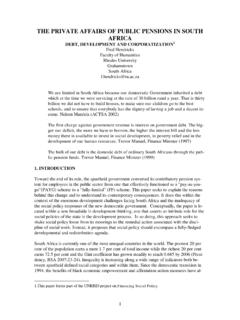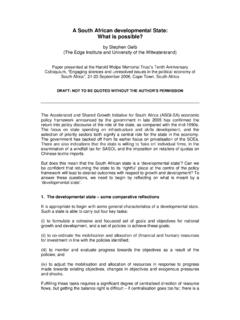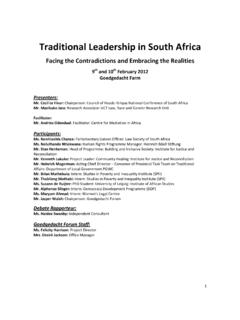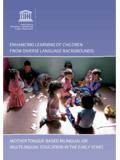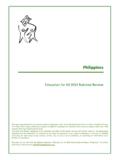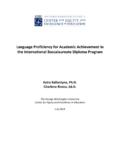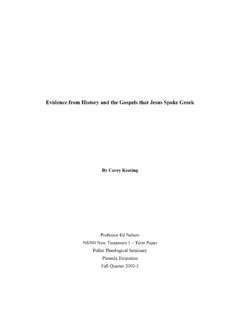Transcription of “Language, class and power in post-apartheid …
1 Language, class and power in post - apartheid south africa Dr Neville Alexander (Project for Alternative education in south africa , University of Cape Town) Harold Wolpe Memorial Trust open dialogue event 27 October 2005, T H Barry Lecture Theatre, Iziko Museum, Cape Town SUMMARY NOTES Introductory statement In their book, Writing Science: Literacy and Discursive power , Halliday and Martin state what ought to be obvious but for the fact that most of us never think about language as an issue in our societies. They postulate that The history of humanity is not only a history of socio-economic activity. It is also a history of semiotic activity. In what follows, I want to explicate this statement in the context of post - apartheid south africa by way of analysing a few simply formulated programmatic propositions that are derived from the insights of various schools of thought operating in the discipline known as the Sociology of Language.
2 My immediate purpose is to alert especially the privileged elite layers of the new south africa to the fact that we ignore the details of the language question at our peril. I should like, beyond that, to leave with the listeners and the readers of this contribution the insight that implementing a consistently democratic language policy is a critical component of the consolidation and expansion of the democratic society we are committed to. Because of its programmatic character, this essay can be no more than a starting point for a much more in-depth discussion and for wide-ranging research on the impact of language policy in the critical domains of social life. My approach is based on and influenced by my understanding of Marxism as a method of social analysis, by the social reproduction paradigm of the late Pierre Bourdieu, whose work in this domain has been exceptionally creative and illuminating, and by the theoretical and political practice of V.
3 I. Lenin in respect of what used to be called the national question . Leave your languages alone : the fallacy of common sense In his Planning Language, Planning Inequality, James Tollefson (1991:2) wrote .. (Language) is built into the economic and social structure of society so deeply that its fundamental importance seems only natural. For this reason, language policies are often seen as expressions of natural, common-sense assumptions about language in society. Harold Wolpe Memorial Trust open dialogue event, 27 October 2005, Cape Town 2 The purpose of his book is to rebut this all-pervasive notion and to demonstrate by way of many significant historical and contemporary examples that language policies are governmental strategies designed, mostly consciously, to promote the interests of specific classes and other social groups.
4 This is, therefore, the first proposition to note; it is not true that languages simply develop naturally , as it were. They are formed and manipulated within definite limits to suit the interests of different groups of people. This is very clear in the case of so-called standard languages, as opposed to non-standard varieties (dialects, sociolects). The former are invariably the preferred varieties of the ruling class or ruling strata in any given society. They prevail as the norm because of the economic, political-military, or cultural-symbolic power of the rulers, not because they are natural in any meaning of the term. The importance of this proposition derives from the fact that it validates the claim that languages, just like cities or families, can be planned. Indeed, it is a fact that in any modern state, whether or not it is explicitly acknowledged by governments, languages are always planned, in that legislation prescribes, often in great detail, where and how one or more languages are to be used.
5 This is universal practice and, as I shall have occasion to show, it has significant consequences in critical domains such as education . In regard to post - apartheid south africa , it remains to be said that the principle as well as the practice of language planning is accepted. However, lack of implementation planning and, thus, of delivery, tends to negate the principle and to reduce it to mere lip service. The power of language and the language of power There are two fundamental sources from which language derives its power , , the ability of the individuals or groups to realise their intentions (will) by means of language (empowerment) or, conversely, the ability of individuals or groups to impose their agendas on others (disempowerment of the latter). For human beings to produce the means of subsistence, they have to cooperate and in order to do so, they have to communicate.
6 Language is the main instrument of communication at the disposal of human beings; consequently, the specific language(s) in which the production processes take place become(s) the language(s) of power . To put it differently, if one does not command the language(s) of production, one is automatically excluded and disempowered. At this point, the relationship between language policy, class and power ought to become intuitively obvious. But, as I know from many years of experience, this is an optimistic view. Consequently, I shall spell out some of the implications of this particular insight for modern industrial societies1. For reasons connected with the colonial history of southern africa , the language of power in post - apartheid south africa is undoubtedly English. Afrikaans continues to play an ancillary role in the processes of economic production in the so-called formal economy even though there are determined attempts to reduce its significance in this domain as well as in other high-status domains.
7 The question that we will have to consider presently is whether this fact in and of itself implies, as is often said and universally assumed, that English is enough and what the implications of this belief are for democracy and development. 1 In a recent paper prepared for a conference on Language and Poverty, held at Cornell University in the , I discussed these implications in detail as they pertain to the educational system. Language, power and class in post - apartheid south africa 3 The other source of the power of language is its function as a transmission mechanism of culture or, more popularly, its role in the formation of individual and social identities. In this essay, I shall not deal with this matter any further even though it is necessarily implicated in the general discussion of the broader topic of language, class and power .
8 The reason for this is that consideration of the psychological and sociological issues involved in the question of identity would tend to blur our focus. Suffice it to say, therefore, that being able to use the language(s) one has the best command of in any situation is an empowering factor and, conversely, not being able to do so is necessarily disempowering. The self esteem, self-confidence, potential creativity and spontaneity that come with being able to use the language(s) that have shaped one from early childhood (one s mother tongue) is the foundation of all democratic polities and institutions. To be denied the use of this language is the very meaning of oppression. In Lenin s words, .. (a) democratic state is bound to grant complete freedom for the native languages and annul all privileges for any one language.
9 A democratic state will not permit the oppression or the overriding of any one nationality by another, either in any particular region or in any branch of public affairs (Lenin 1983:138. Emphasis in the original). English is enough: the class character of the monolingual habitus The hegemony of English, or of other languages, is not merely tolerated in the developing world; it is considered a legitimate model for society. In many newly independent states, a tiny English-speaking elite controls state policy-making organs while the masses of the people remain excluded.. A world system that is more just and equitable depends upon an understanding of how people can gain control of their own institutions. A key issue is the role of language in organizing and reproducing those institutions (Tollefson 1991:201). Twenty years earlier, Pierre Alexandre (1972:86) had shown clearly how for post -colonial africa , proficiency in the language of the former colonial power (English, French or Portuguese) constituted cultural capital and was an index to the class location of the individual, since this ability almost automatically elevated the speaker into the ruling elite.
10 At this point, it would be necessary to discuss in some detail Pierre Bourdieu s theory of the evolution of linguistic markets, from which this insight derives. For reasons of focus, however, I shall simply draw attention to the immediately relevant propositions as they apply to our own context2. The hierarchical relations between different varieties of a language or between different languages are a reflection of the historically evolved relations of domination and subjugation between the speakers of the relevant varieties or languages. In the south African case, Dutch, English and, later, Afrikaans, came to be the legitimate languages in different periods of our history. This legitimacy was/is the result of colonial conquest in the first instance but, as the structural transformations that accompanied that cataclysmic event became routine, dominance was complemented and reinforced by hegemony.
